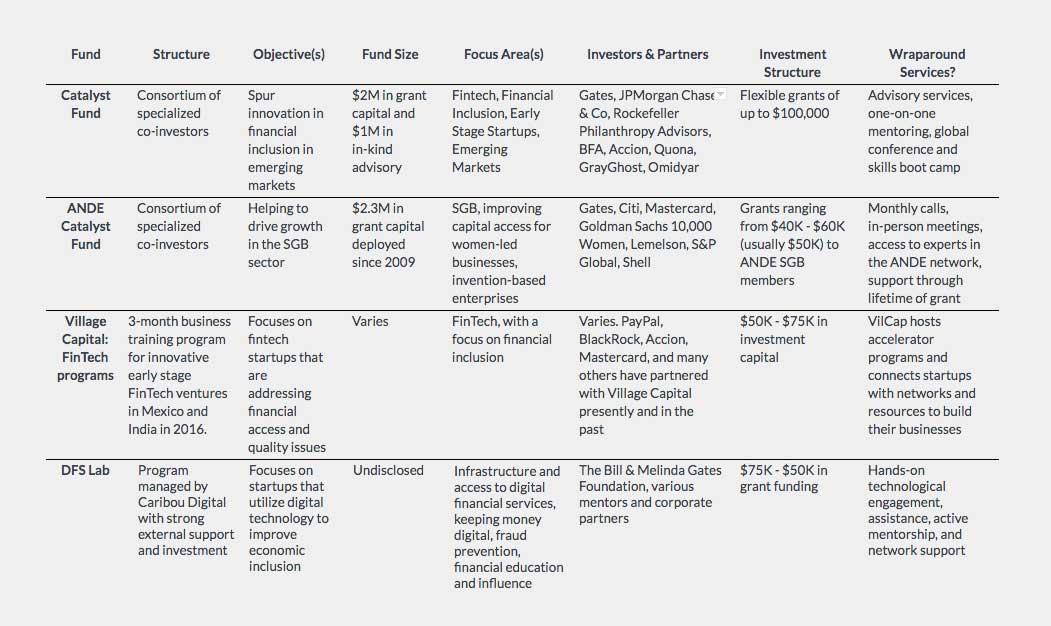A Tale of Two Catalyst Funds

It takes money to make money, the saying goes. This holds true both for early-stage startups and pilot projects that are targeted towards supporting entrepreneurs. So how do these entrepreneurship-focused efforts get off the ground when they are too risky for traditional investment, but cannot prove their value until they raise enough money to grow their businesses? If entrepreneurs can help solve some of the world’s problems, what will it take to remove the barriers that hold them back?
In the best and worst of times, supporting entrepreneurs can be a risk. Yet two funds set out to solve these challenges by acting as catalysts and creating an environment that allows for entrepreneurs to develop their ideas, and to grow their enterprises. Philanthropic funds that focus on impact would be key to these efforts, and they were specifically meant to address critical issues that emerging economy startups face.
It was not until later the teams realized that not only were the goals similar, but even the names had started to converge. In 2016, a consortium of leading philanthropic institutions and impact investors launched the “Catalyst Fund” while the Aspen Network of Development Entrepreneurs (ANDE) relaunched its “ANDE Catalyst Fund.” Catalyst Fund focuses on driving technology innovation in financial inclusion. The ANDE Catalyst Fund aims to source a diverse set of solutions addressing issues facing small and growing businesses (SGBs). Both funds share a vision to mobilize social entrepreneurs through philanthropic dollars.
The financing conundrum actually points to an encouraging “catalytic fund” trend that is helping to fill a gap in the kinds of finance that a business or project may need to get started. In fact, a variety of funding organizations are recognizing that their philanthropic dollars can spur innovative ideas into motion, or catalyze them. And these catalyst funds do more than provide finance: they also provide a suite of services to strengthen the organizations that receive the funding, and in doing so create greater impact. These are sometimes referred to as wraparound services.
But not every catalytic fund is right for everyone. We have identified a group of mission-oriented funds that seek to source and finance organizations in similarly innovative ways. By comparing funds, we hope to help social entrepreneurs identify the kinds of programs that best suit their needs.
What does it mean to be “catalytic”?
Diving deeper into the nuances of each fund reveals shared missions and methods that can provide game-changing finance for early stage enterprises. These funds also attempt to address specific problems where traditional funding-only approaches often fall short. So what does it really mean to be “catalytic” when providing grant financing to small and growing businesses (SGBs) or SGB intermediaries?
Unique Characteristics
- Each fund leverages a consortium of top funders, investors and partners committed to advancing a shared objective
- In addition to providing grant capital, these funds provide important wraparound services (e.g., advisory services, mentorship, branding and communications services) for grant recipients
The Value of Wraparound Services
- Individual needs dictate the kind of support that the fund structures for its investees
- The power of a diverse investor network is leveraged to assist the startup in solving impediments to growth
- Support is tailored to very early stage companies still looking to define their service offering
- Advisory services, mentoring and networks give startups the knowhow to test and validate if their products or services serve a real market (where usually there is no precedent)
When Does a Consortium Model Make Sense?
There are numerous deep-pocketed funds, many of which are operating in the same sector and/or geographic area looking to solve the same problem. Combining a variety of industry experts into one cohesive unit allows the fund to conduct smart diligence and focus on supporting the most promising ventures in a more effective way. The consortium model can increase efficiency by pooling resources, unlocking the requisite amount of capital, and avoiding doubling up on any one particular investment or project. In addition, this approach can open the door for follow-on equity investments in which a robust team of investors already understands the business and is comfortable with the relationships between each other and the firm. For example, Village Capital has extended its service offerings from challenge funding to equity investments as well. A consortium approach has the unique ability to encourage problem-solving with a distinct depth and breadth of perspectives.
Our Roundup of Catalytic Funds

Catalyst Fund is a new philanthropic fund, which is managed by BFA (Bankable Frontier Associates). Catalyst Fund provides capital in the form of grants and advisory services to early-stage inclusive fintech startups, while sharing industry insights from lessons learned about accelerating inclusive digital financial services. The objective of the Catalyst Fund is to accelerate the financial inclusion industry’s collective understanding of new business models and technology that make it cheaper and easier to deliver financial services to unreachable or underserved customer segments.
The inspiration for the Catalyst Fund came from a 2014 roundtable organized by the Bill & Melinda Gates Foundation, which brought together a group of investors to discuss some of the barriers faced by financial inclusion startups in developing countries and potential approaches to support their success. The consensus by this group of like-minded investors, was that supporting very early stage startups remained a challenge. Following the roundtable, Accion Venture Lab continued working closely with the Gates Foundation to develop a collaborative solution, in which a blueprint for the Catalyst Fund was developed to catalyze pre-seed inclusive fintech startups.
Supported by the Bill & Melinda Gates Foundation and JPMorgan Chase & Co., and fiscally sponsored by Rockefeller Philanthropy Advisors, the fund also has the guidance of ANDE members, Accion, Omidyar Network, Gray Ghost Ventures; as well as that of Quona Capital. Catalyst Fund was launched in 2016 and will be active until end of 2018.

The ANDE Catalyst Fund is a unique grants program (available exclusively for ANDE members) that supports experimentation and encourages collaboration. Since its launch in 2009, more than $2 million in grants have financed riskier pilot programs with the greatest potential to benefit the small and growing business (SGB) sector. Grants have typically ranged between $40,000 and $60,000 and have often supported joint projects between member organizations with complementary expertise.
The goal of the ANDE Catalyst Fund is to increase the productivity and effectiveness of ANDE members, as well as to encourage increased collaboration between organizations, while creating tools and insights that can help the SGB sector as a whole. Since inception, the fund has seeded dozens of creative programs that have typically fallen into one of four categories including: tools/platform, training, research and networking.
Winning grants have supported a diverse set of programs in varied geographies and many projects have continued on, or spun off into larger more established endeavors. This year, the ANDE Catalyst Fund is conducting another call for proposal to uncover novel ways to unlock access to capital for women-led enterprises and invention-based entrepreneurship.
Village Capital, in collaboration with partners such as PayPal, BlackRock, DBS, Accion Venture Lab, and Crédito Real, hosts a 3-month business training program for innovative early stage Fintech ventures in Mexico and India in 2016. The Fintech: Mexico and Fintech: India programs bring together prominent stakeholders, leading investors and industry experts from across the countries in efforts to collectively tackle these issues around financial inclusion. At the end of the programs, the top two peer-selected ventures from each country will receive an offer for $75,000 USD investment in pre-committed capital from VilCap Investments and Pomona Impact (for Mexico), and $50,000 USD investment from VilCap Investments (for India).
Caribou Digital’s DFS Lab engages in pre-seed investing and rapid prototyping of breakthrough fintech innovations that will profitably bring digital financial services to low-income consumers in developing countries. DFS Lab seeks brilliant entrepreneurs to collaborate in building these solutions. The Lab brings concepts to market through an incubation process that includes funding, but also operational support, deep domain expertise, local knowledge and contacts needed to successfully incubate new ideas. DFS Lab is supported by the Bill & Melinda Gates Foundation.
A Comparison of Catalytic Funds

A Winter and Spring of Hope
What each of these early-stage impact funds have in common is a shared goal of seeding often risky ideas that may not otherwise source more “mainstream” grant capital. While early-stage grant capital is not a silver bullet for every entrepreneur seeking to grow their business, we are encouraged to see different models emerging to support entrepreneurs at different stages of their journey. The path from ideation to achieving significant market traction is challenging for any small business, but especially for those seeking social and financial returns. We hope this growing list of impact funds will serve as a resource to emerging startups while educating other managers of grant capital interested in adapting their portfolios.




